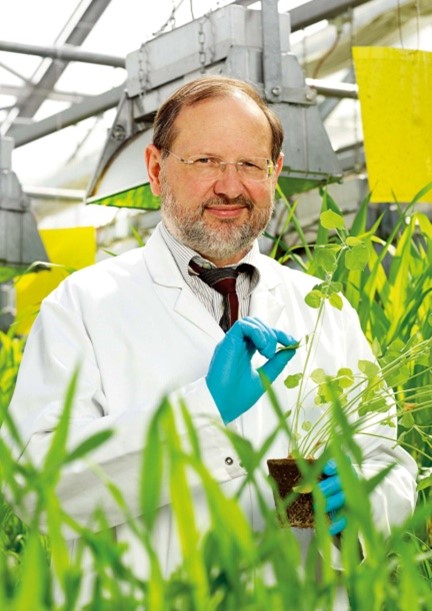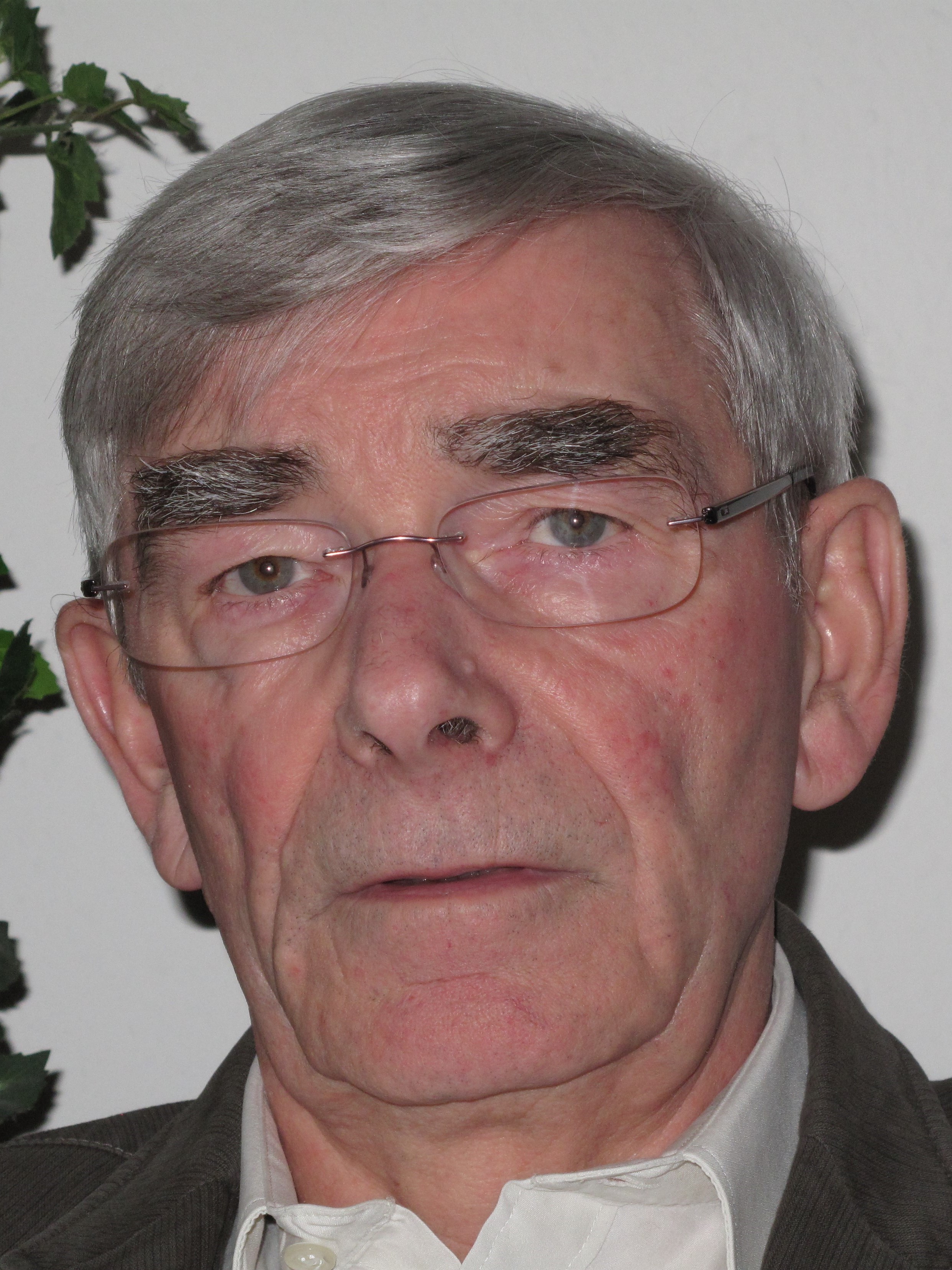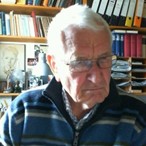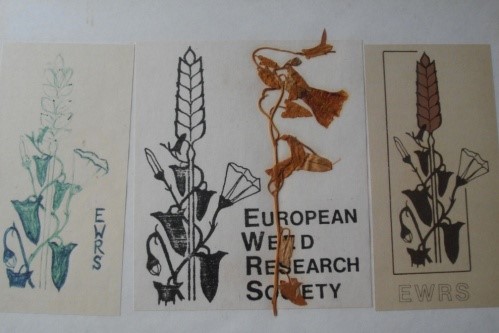Presentation of the EWRS Honorary Members
Posted on November 3rd, 2022 on 15:26:47 by A.C. Moonen

In this BLOG we present you the EWRS Honorary Members. It is a nice opportunity to get to know some of the people who provide an outstanding contribution to our Society and to 'Weed Research'.
The EWRS Honorary members in 2022 - get to know them all
Starting from the most recent nomination
Part 1: Curricula
Part 2: Speeches of the Honorary members
Hansjörg Krähmer
EWRS Honorary member from December 2021

Together with Peter Baur, Competence Centre Crop Protection, Clariant, Frankfurt/Main, he published a comprehensive book on Weed Anatomy at WILEY BLACKWELL. Essential for all weed scientists, this book provides fully comprehensive coverage, including the world's 50 commercially most important species, with detailed, full colour photographs throughout. Beginning with a general overview of weed anatomy, structured in a way similar to other classical plant anatomy textbooks, this book discusses monocots, dicots, brackens and horsetails with special reference to their anatomy.
Dr. Hansjörg Krähmer is an outstanding consolidator of the private as well as public sector in weed research and enthusiastic promoter merging weed science and solutions for farming.
His efforts for the mission of EWRS are primarily related to the weed flora and weed mapping.
Hansjörg Krähmer is Past President of the European Weed Research Society (EWRS). The 48th EWRS General Assembly in 2021 accepted the proposal of the EWRS Board to welcome Dr. Krähmer as a new Honorary Member of our Society.
Dr. Hansjörg Krähmer’s EWRS career covers:
EWRS Vice-President and Head of the Scientific Committee 2008-2009
EWRS President 2010-2011
Founder and coordinator of the EWRS Working Group “European Weed Mapping” 2009-2011
Right-hand moderator of the EWRS Working Group “European Weed Mapping” 2012-onwards
Active contributor to the EWRS Newsletters 2009 onwards with a long series of the histology of weed species
Other EWRS merits are:
Key Organizer of the 15th EWRS Symposium 2010 in Kaposvar, Hungary
First Author of a Review article on “Weed Surveys and Weed Mapping in Europe” (Crop Protection 2020)
Jon Marshall
EWRS Honorary Member from June 2019
Jon Marshall is now retired and was Editor-in-Chief for the journal Weed Research from 2005 until 2019. He is a research ecologist, specialising in agroecology, vegetation management, weed science, and the interactions between crop and non-crop habitat on farms. Jon’s first degree was in Biology at the University of York, UK and his PhD on Weed control in drainage channels and its ecological effect was conferred in 1978 at the University of Wales Institute of Science and Technology, Cardiff, UK. His initial research focussed on aspects of vegetation management, first on aquatic weed control at the UK Freshwater Biological Association and then at the Weed Research Organization, Oxford. He subsequently worked on non-crop vegetation management, including roadside verges, country parks and amenity areas. His work at Long Ashton Research Station, Bristol, UK, where he led the Agroecology Group, focussed on vegetation on farms, including interactions between arable crops and field boundaries. His studies on weed movement and herbicide impacts led to the development of sown field margin buffer strips for arable fields. The technique is now supported by UK agri-environmental schemes; farmers are given financial support to create and manage these features. In 2001, Jon created a small research company, Marshall Agroecology Limited, which closed in 2017. Jon is now retired from active research and editing.
In EWRS, Jon Marshall has done a great job during all the 13 years of his activity for the benefit of the European Weed Research Society.
Sidelines: Jon was born in Uganda and plays Great Grand Masters field hockey for England.
Jens Carl Streibig
EWRS Honorary Member from June 2018

Jens’ major research has been in the area of herbicide selectivity, joint action of pesticide mixtures and ecotoxicology of pesticides. He has also worked with genetically modified crops and risk assessment. He has been involved in various national and international projects within his area of research and has had assignments in Africa and Asia. His teaching has primarily involved Weed and Crop Science, with an emphasis on pesticide use, mode of action and ecotoxicology.
Jens has 40 years of EWRS Membership and he has always been an enthusiastic contributor to the Society. He was Scientific Secretary of the Society’s Scientific Committee for 8 years (1994-2001) succeeding to Dr. Ray Hance and before Dr. Paolo Bàrberi took over this task. He served as Secretary during those periods when the EWRS Vice-Presidents Prof. Dr. Karl Hurle, Dr. Helmut Walter, Prof. Dr. Martin Kropff, and Dr. Jean-Pierre Claude were Chairmen of the Society’s Scientific Committee.
Jens served for 15 years (1982-1995) as editor of the Society’s journal WEED RESEARCH, and 3 years (2011-2015) as subject editor Weed Science of the journal Crop Protection. Together with Dr. Jon Marshall, Editor-in-Chief of the Society’s journal WEED RESEARCH, Jens developed a short course on how to write a paper for an international journal like WEED RESEARCH, aimed at PhD students. This course was offered at various EWRS Symposia, like the one in Samsun, Turkey, in June 2013 and that of Montpellier, France, in June 2015.
Jens was coordinator of the EWRS Working Group Education and Training at least from 2008 through to 2017. He himself was also very much involved in the education of PhDs engaged in weed science, specifically in a course that focussed on the advantage of modern non-linear statistical software to analyze and interpret experiments. Non-linear dose response curves are fundamental to understanding herbicide selectivity and efficacy. This principle can easily be extended to various other branches of weed management ranging from allelopathy to flame weeding and from weed-crop competition to laser cutting. Jens frequently organised workshops on this topic, also outside of Europe, like in June 2008 in conjunction with the International Weed Science Congress in Vancouver. In these workshops he closely collaborated with Christian Ritz. A homepage on Statistical Analysis of Agricultural Experiments with R was established.
His publication list contains more than 360 papers, mainly on Crop and Weed Science. These papers are written not only in English, but also in Danish in respect of specific agricultural problems in Denmark and the other Scandinavian countries.
In 1998, Jens became Honorary Member of the Weed Science Society of America (WSSA). Recently, the International Weed Science Society (IWSS) bestowed Jens the Outstanding Achievement Award 2016 in Prague during the 6th International Weed Science Congress (IWSC). Every four years, the IWSS bestows awards on weed scientists who exemplify outstanding performance in science and service. Very relevant for receiving this particular award are the candidate’s contributions to weed science made outside of one’s job description, and outside of their employer’s working hours.
Also nowadays, Jens is still very active. He is technical adviser for Idea Tropical, a leading provider of research and consulting services in weed management and herbicides for tropical crops. Jens is member of the board and statistical advisor of Agrolab AS being the leading research organization in the EU north zone with experience dating back to 1984. Since then, Agrolab has successfully helped companies by testing, developing and registering plant protection products in the European Union.
EWRS Executive Committee and Heritage Committee 2018 (LB, TE, BP, JS)
Karl Hurle
EWRS Honorary member from June 2007

The European Weed Research Society owes a substantial debt of gratitude to Professor Hurle for his considerable input into the society over many years. He was a member of the editorial board of Weed Research for seventeen years, between 1972 and 1988. In 1994 he was elected as Vice-president of the society and assumed presidency in 1996. During this period, he was very influential together with Friedhelm Schwerdtle in promoting weed science activities in central and eastern Europe. He was the EWRS National Representative for Germany between 1995 through 2003.
Professor Hurle has had a long and distinguished career in weed science. My first recollection of his work was in 1970 when he co-authored a paper for The British Weed Control Conference on the topic of 'Changes in weed flora composition as a result of continuous cereal cropping and annual use of herbicides' which reported an increased occurrence of Stellaria media and Galium aparine in response to repeated application of MCPA. In the same year appeared the first of many papers in the house journal of EWRS, Weed Research in which he drew attention to the phenomenon of enhanced degradation in relation to repeated applications of MCPA. There followed a number of papers dealing with the subject of adsorption and degradation of soil acting herbicides in relation to soil pH and ionic status. It is not surprising therefore that he should have contributed a chapter together with Allan Walker on 'Persistence and its Prediction' in the textbook commissioned by EWRS on 'Interactions between Herbicides and soil' in 1980. He went on to develop bioassay methods to validate reproducibility of dose response relationships of soil acting herbicides, again with publication in Weed Research.
Likewise he has been a frequent contributor to the Symposia organised by EWRS including membership of the programme committee on 'Theory and Practice of the use of soil applied herbicides' in 1981. He made several contributions to the Symposium 'Quantitative approaches in weed and herbicide research and their practical application' held in Braunschweig 1993 concerning environmental fate of herbicides in water. However, it was his involvement on the organising committee of the EWRS Symposium 'Economic Weed Control' held at Stuttgart -Hohenheim in 1986 that drew my attention to Karl's wider interests in Weed Science. In research areas closer to my own activities, publications include 'Effects of nitrogen fertilisation on competition between weeds and winter wheat' and 'Influences of primary tillage on weeds -a contribution to the prediction of infestations'.
His research activities in collaboration with his research students continue to be diverse and dynamic with recent studies of weed threshold determination, effects of weather conditions on efficacy of foliar applied herbicides, allelopathy, biological control of Convolvulus arvensis involving the use of mycoherbicides, and the use of molecular techniques for quantification of herbicide resistance in Amaranthus spp. While Professor Hurle has continued to be loyal to Weed Research, in collaboration with his co-authors he has also published widely elsewhere including Zeitschrift Pflanzen& Pflanzen and a continued relationship with The British Crop Protection Council.
On behalf of EWRS I would like to express our gratitude for his unstinting support over the years and for his tireless contribution to the subject of weed science.
Bob Froud-Williams
Past President EWRS
Thomas Eggers
EWRS Honorary member from 2002

In 1971, Thomas Eggers moved to the newly established Weed Research Institute of the Federal Biological Research Centre for Agriculture and Forestry at Braunschweig where he specialised in weed biology and ecology including aspects of nature conservation. Some major projects dealt with the protection of threatened arable weed species in their natural habitat. He established a weed garden of more than 100 species. The possibilities of biological weed control under central European conditions were also a subject of his research programme. In recent years he has been involved in the assessment of the biological efficacy and approval of herbicides in Germany.
As early as 21 March 1975 Thomas Eggers became Ordinary Member of the Society, and his first major activity was in 1976 when he created the EWRS Logo.
From 1982 through 1987 he was Secretary of the Executive Committee, including the tasks of a Membership Officer and Editor of the NEWSLETTER the German version of which he translated from 1992 until 1996.
During his term of office as Secretary Thomas Eggers was a member of the committee that made the 1st revision of the Constitution (1984...1986), and was again a key participant in the 2nd revision of the Constitution which was adopted in 1999. In 1987 he was elected as Additional Member of the Executive Committee (until 1995), and he served still on that Committee as Membership Offir until the end of June 2000. His role as Membership Officer for so many years has been of great value to the Society, providing continuity for the records of membership.
Thomas’s frequent, concise and idiosyncratic messages and e-mails to national treasurers ensured that the administration of the Society continued to function effectively for many years. He has recently been re-elected as Additional Member of the Executive Committee (2002-2005), so his experience will continue to be available to the Society. It should also be mentioned that he was Subscription Collector for Austria, Germany, Scandinavia, and Switzerland from the late 1970ies until 2000.
From 1986 to 1997 he was member of the Editorial Board of our scientific journal WEED RESEARCH, and from 1984 until 1994, when the trilingual phase ended he was also responsible for the German summaries, Zusammenfassungen, of all papers published in WEED RESEARCH.
Finally, but by no means least in importance, Thomas Eggers provided valuable advice to the organisers of several EWRS symposia. He was member of the Organising Committee of the 5th EWRS Symposium 1986 in Stuttgart-Hohenheim, Germany, and member, or head, of the Organising Committees as well as secretary of the Programme Committees of the 3rd EWRS Symposium 1979 in Mainz, Germany, and of the 8th EWRS Symposium 1993 in Braunschweig, Germany. For the 9th EWRS Symposium 1995 in Budapest, Hungary, and the 10th EWRS Symposium 1997 in Poznan, Poland, he served as Programme Secretary. His experience and attention to detail have been of great value to the other members of the organising committees of these conferences.
Messages from the Honorary members
Video message by Jon Marshall shown during the GA at the 19th EWRS Symposium in Athens 2022: view here
Presentation of Hansjörg Krähmer during his bestowal at the 19th EWRS Symposium in Athens:
During his bestowal in 2018, Jens Carl Streibig held the following speech:
Ladies and Gentlemen!
It is a privilege to get an opportunity to make a toast at this prestigious event in the beautiful Slovenia. I have been fighting the weeds long before I knew why they were so tough to get rid of. I had no problem in identifying them in the sugar beet fields. However, I have never dreamt that I should become a professional weed warrior and eventual become a professor of this anthropomorphic classification of certain plants.
For 45 years, I have been fighting weeds. Apparently, I did not succeed very well. They are still around. My wife cannot understand I tolerate weeds in the garden; I reply that I have an academic attitude to weeds. These years have been exciting. From the hay days of the herbicide development, the companies delivered highly specified selective herbicides that could keep the weeds at bay without too much manual labour. It coincided with the emigration from the rural areas to the cities to escape the drudgery of weeding. We thought the sky was the limit, but alas spraying millions of ha. has its costs. Nature backfires in a way we ought to have forecasted if we had paid a little better attention to the second year high school biology lessons.
Twenty-two years ago, we got the Roundup Ready crops and believed it was the silver bullet. Yes, we actually got many problem weeds controlled. But what happened? Nature fired back in producing, more herbicide resistant weeds. Now there are more people engaged in understanding the development of herbicide resistant weed, than people actually trying to control the darn weeds.
I am a grumpy old man, but it is an interesting avenue weed science has taken. In the past, we feared the weeds and now we fear the herbicide residues. When we spray, the herbicides are out in the environment and it is only a question of analytical ingenuity to measure incredibly small concentration of herbicides. It is not rocket science it is common sense. People are scared to death from drinking tab water with very small herbicide concentrations. There is rarely such thing as a blank water sample! As the Americans say there is no such thing as a free Symposium dinner.
Another aspect of working with weed science is how the word weed has changed its meaning. If you google ‘weed’ you might get: ‘Weeds are God's gift to the world. Bring peace when used wisely’.
The first time I experienced this change of meaning of the word weeds, I was flabbergasted. In my youth weeding the sugar beet brought skin cancer and sore backs, not peace. I realized what was going on in the real world of weeds when I crossed the border between Canada and the US 20 years ago.
Being asked my profession, I told the police officer I was a professor of Weed Science. Holy cow!! He would not let me in!! It required a bit of explanation and persuasion to calm him down. The terms weed is a classification of plants, we neither want in croplands, in gardens nor other man made so-called “natural habitats”. We decide what a weed is. It means it is our arrogance toward nature that prevails. The weeds could not care less; they are still popping up everywhere. In the heritage from the rural past, the word weed was negative. In Danish we say: “Ukrudt forgår ikke så let”, the Germans say: “Unkraut vergeht nicht!“. I was told, the English do not have this expression,
But what about: “Weeds are like old soldiers, they do not die, they just fade away!”
Let’s give a toast to the weeds!
2342 x viewed | 18 Likes -
Message to the author
Filter by theme
Filter by Working Group
How can I submit a post?
We would like to welcome you as a contributing author for the EWRS blog. Please contact the Communication Officer, Camilla Moonen. She can give you writing access to the blog. After that, you can start writing articles for the blog, from the 'My Account page'. More information can be found on the "How to use the Blog page".



